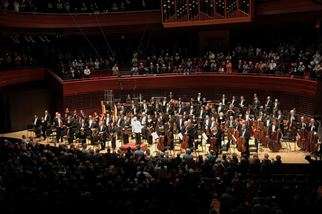|
Back
Mahler Unbound Philadelphia
Verizon Hall
05/09/2019 - & May 10, 12, 2019
Gustav Mahler: Symphony no. 9 in D Major
The Philadelphia Orchestra, Yannick Nézet-Séguin (conductor)

(© Ashley Berke)
Philadelphia Orchestra conductor Yannick Nézet-Séguin has been lauded for his approach to Gustav Mahler’s symphonies and you can understand why if you were in Verizon Hall on May 9, for the first of three performances of Mahler’s 9th Symphony. There was a palpable sense of musical occasion among the sold-out audience, as Yannick bounding onstage in his stylish tunic and for the next 90 minutes conducted, sans baton, with passion and revelatory musical clarity.
Composed in 1909-10, the 9th is a defining masterpiece that showcases Mahler’s progressive musical vision. The 9th now strikes as prescient to so much that was to come, from the more categorized neoclassicists. Mahler’s musical architecture is built right before our ears, on its own terms, everything makes compositional sense. Nézet-Séguin has a potent approach to its more innovative, abstract agency in real time. The majestic shadow of Beethoven’s 9th Symphony, hung over many composer’s, including Mahler, who refused to put the number on his 9th, titling it instead Das Lied von der Erde (Song of the Earth). He may have been psyching himself out unnecessarily after his own towering 8th Symphony ‘of a Thousand.’
Whatever reservations Mahler may have had, the 9th is a groundbreaking masterpiece, that still inspires and aesthetically is conducive to many symbolic interpretations. Among conductors, it has been ranked fourth among the greatest symphonic works. Among speculation about its mystique is that it is “music from another world...” (Herbert von Karajan), “A vision of eternity...” (Alban Berg), and even “based on Mahler’s irregular heartbeat” (Leonard Bernstein). Bernstein, in particular, taps into its potential profound dramaturgy of the human condition.
Nézet-Séguin seems to do everything not to lean on any freighted meaning. Whether Mahler had metaphysics in mind, the natural world or his heartbeat can be a separate question when the symphony is rendered with lustrous orchestral clarity, as a powerhouse of musical ideas can, as it was in this performance, be a moving sensorial experience. This performance was bursting with stellar musicianship from soloists and as an ensemble. Nothing was wayward, nothing was foggy, nothing was symphonically vamped.
Harpists Elizabeth Hainen and Helen Gerhold stellar in the harp passages, essaying those mystical descending scales. It doesn’t suggest the celestial, but as beautiful the lower tones are, it portends disquieted realms or sensibilities. It precludes the same effect Stravinsky used later in his ballet score Orpheus. Jennifer Montone’s steely horn solos a resplendent standard, the inviolate voicing, through Mahler’s sonic storms. An incomplete list of other standout soloist performances Jeff Khaner (flute), Kirsten Johnson (viola), Kimberly Fisher (violin), Daniel Matsukawa (bassoon), Hai-Ye Ni (cello), Yumi Kendall (cello), David Kim (violin), David Bilger (trumpet), and all the way down the line in the basses and horns.
There are so many shifts in ideas, in tempo, in experimental tonals that have been much debated since. Mahler laces in some neo-baroque-isms and perhaps even musical jabs at Viennese conventions. Meanwhile, luminous symphonic passages build and suddenly vanquished by muted clarion horns, or punched through another musical realm altogether. Even with moments of in the 4th movement, with those lush, taut string passages, full of implied emotion, it is music completely untethered to the Romantic era.
In comments before the performance, Nézet-Séguin noted that Mahler’s 9th hadn’t been performed in Verizon Hall for 14 years. Of all of the large, technically and artistically demanding symphonic works Yannick has conducted here this past decade, this, I believe was the most triumphantly, defining performance by the Philadelphians under his directorship. Each of the orchestra’s sections is artistically present in this work. One of Nézet-Séguin’s strengths is to balance and equalize large symphonic works. With more success with some composers than others. These Mahler concerts were a substantive work-out, finishing just two days before the Philadelphians embarked on their three-week 2019 China tour.
Lewis Whittington
|